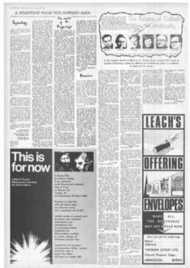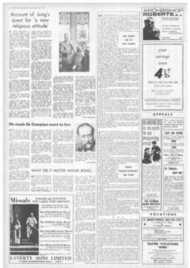Page 5, 18th March 1966
Page 5

Report an error
Noticed an error on this page?If you've noticed an error in this article please click here to report it.
Tags
Share
Related articles
Europe's Future
Don't Be Merely Defensive
Questions Of The Week
Workers' Parliament Turns Down U.s.
A Student Replies To John Brains
Christianity and Europe's future
How do you assess the Christian contribution to the political development of postwar Europe?
Postwar developments in Europe were characterised by the overcoming of hatred, distrust and fear, and at the same time of material distress. This called for a great deal of patience and understanding. and a high degree of readiness to help. These things grew out of an awareness of Christian solidarity that had till then been smothered.
Hence Christian politicians were trusted by the majority of their compatriots. They set out on the way towards understanding and towards a peaceful and friendly union of their peoples. It was above all their common Christian conviction which enabled the nations of Europe to grow together.
Christian Parties
Do you still today—as compared with the situation in 1945—believe in the value and importance of specifically Christian Parties? How are Christians to be effective in the political sphere in face of the growing number of agnostics, atheists and humanists?
THE IMPORTANCE of Christian parties today is just as great as in 1945, if not greater. The growing influence of a-Christian and atheistic forces makes cohesion and cooperation on the grounds of our common Christian principles all the more necessary.
Europe's roots are Christian. If they are cut Europe cannot thrive. To the anti-spirit of materialism and the chaos of nihilism we must convincingly oppose the image of a Christian order determined by the principles of justice and charity.
The Pope
Do you get the impression that papal pronouncements and the proclamation of Christian teaching have any real effect on world statesmen?
THE POPE of the Roman Catholic Church is a moral authority recognised today throughout the world by Christians and non-Christians alike. The pronouncements of the Popes on_ for example, problems of peace and of a just world order have not only directly influenced the deliberations of statesmen but also offer hope to all men of goodwill.
Pope Paul VI's address to the United Nations and his initiatives for a cease-fire in Vietnam have recently given a fresh demonstration of this.
Ecumenism
Do you believe in the possibility of a consolidation of Europe on the basis of Christian Democrat policies? How do you at present regard the relations between Catholics and Christians of other confessions in European politics? Has the ecumenical movement had a favourable effect on them?
A POLICY BASED on Christian responsibility is the surest possible foundation for European unity. This does not mean that such a Europe can only come about by the co-operation of Christian Democratic parties, for in some countries Christians have not combined together in any such party.
But politically active Christians will always take the lead in working towards a united Europe. Hence close and good relations between Catholics, Anglicans and Protestants, extending to the political sphere, are important and indispensable for the future of Europe. The ecumenical dialogue is a valuable contribution to this.
Political practice
How do you assess the present attitude of the Socialist parties of Western Europe towards the Church?
THE SOCIALIST PARTIES of Western Europe seem much concerned at the moment to revise their traditional anti-Church attitude. But I have the impression
that considerable differences often remain between what they declare in their programmes and their political practice.
United Europe
Is a united Europe viable if its defence is wholly or even only partially dependent on the United States?
The still unreduced opposition and tension between the free world and Bolshevism represent a special danger to Europe. Peace is at present guaranteed only by the balance of military strength. This will continue to be the case so long as the Soviet Union opposes all disarmament under inspection.
But Europe can live only in a peaceful world. Hence the strength of America and the common defence preparations of the NATO countries are the guarantee of the peace and safety of Europe. Of course. Europe will become the more viable the more its peoples unite together economically, culturally and politically.
Vatican Council
Did you, in this respect, feel that the Council's decree on the Church in the modern world was a confirmation of your ideas?
THE SECOND VATICAN COUNCIL has quite clearly de dared, in that document, in favour of the building-up of supranational communities and the development of international co-operation in the political, economic and social spheres.
The Church has pointed to such action, with all the weight of her authority, as the most hopeful possibility for the elimination of injustices, the righting of wrongs and the avoidance of further disputes; and hence as the foundation for a lasting and assured peace. This is an impressive endorsement of the rightness of the course upon which we have embarked in Europe.
Personal faith
How do you evaluate the relationship between your own personal faith and your achievement as the architect of a great new Europe after the war?
I DON'T LIKE talking about myself. But I think I can say that all my political activity, especially my work for Europe, was sustained by the conviction that political action must be directed by moral prescriptions.
A political commitment to the overcoming of conflicts. to reconciliation and friendship, to peace and a just order, corresponds both to the demands of the Christian moral law and to the guidance offered and the concrete demands made by the Council.
blog comments powered by Disqus











